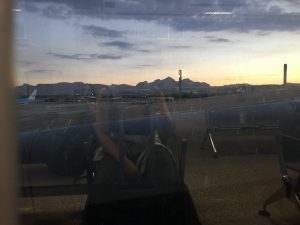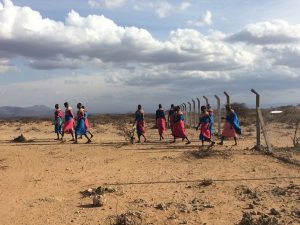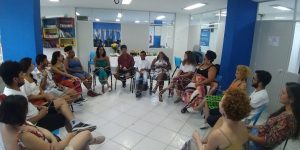From Larissa: Remote from Durham, two dream internships!
I arrived in Durham, North Carolina in January 2021, one semester after the Master’s Program in International Development Policy (MIDP) had started. During the fall of 2020 I studied from home in Rio de Janeiro, Brazil. By Christmas of the most unexpected year of a global pandemic, I was taking the longest route ever made by a Rotary Peace Fellow to acquire a student visa (the American embassy in Brazil was not issuing visas since the start of the pandemic). My journey to reach the United States was not free of stress, but I knew I had to try to do everything I could to be able to live my dream of pursuing a master’s degree at Duke University which began when I first applied for the Rotary Peace Fellowship five years ago.
At the airport on November 2020 to fly to London, UK to get my US student visa
Ever since I first applied to the fellowship, my work in social development has kept evolving. I worked for eight years in a well-recognized NGO in Brazil gaining experience in project management, and have had the opportunity to get involved with amazing projects that work towards migrants’ social and economic integration in Brazil, youths’ first employment programs and trainings for community and social entrepreneurs. While I was pursuing a post-graduate degree in Social Innovation Management in Nairobi, Kenya, 2016, I started noticing perspectives of gender inequalities different from what I had experienced and read about in Brazil. I became more aware of intersectional inequalities regarding race and gender. For instance, the high rates of gender-based violence cases for black women in Brazil, the practice of genital mutilation in rural villages in Kenya, and gender pay gaps between men and women in the two countries.
Women in Samburu village in Kenya with school uniforms they were proud to wear
Since then, gender issues have been calling to me more and more as an area to devote my work. I wanted to use the Applied Field Experience (AFE) opportunity to further dive into this matter and have a professional experience working with experts in the area. I have worked previously with civil society organizations and in social innovation but also wanted to experience different levels of development such as with multinational organizations and governments. An AFE position with UN Women was one of my biggest goals.
After months of applying to vacancies and talking to great professionals that shared their time in informational interviews with me, I was offered a position in the UN Women HeForShe program. HeForShe is a bold and super important campaign that invites men and boys to get involved in the fight for gender equality. It recognizes the important role of men in changing attitudes and discourse that not only prevent women from contributing fully to society, but also negatively affect men. Gender roles and expectations result in men growing up unable to express sensitivity and expected to be “strong”, while women are caregivers and “too emotional”. HeForShe aims to break gender biases by getting men mobilized to make changes. It started as a global campaign with a first 5-year phase of outreach and getting the word out to involve men in the conversation. The program is now transitioning to action-oriented activities where HeForShe selects “champions” from government, private sector, and civil society leaders to commit to specific advancements regarding gender equality. Champions bring their countries or organizations one step ahead in achieving gender equality goals depending on one’s context, and HeForShe helps them to be accountable and exchange best practices and challenges within the network of champions. As a Project Management Officer intern during my AFE, I am facilitating a small hard-working team to determine quarterly targets, clarify roles and responsibilities that will direct the program to reach larger UN Women 5-year and annual goals, and create a routine of project management that does not overwhelm the work. I am also proposing to increase HeForShe’s impact by expanding its partnerships with universities and designing a program of mutual benefits. I am designing the program using as inspiration the HeForShe proven solutions webpage. The shared solutions platform, open source materials and past experiences of the program have been a great way to see in practical terms what an organization such as UN Women can do to help the public and private sectors reach the Sustainable Development Goals, of course mostly focused on SDG 5, which aims to achieve gender equality and empower all women and girls.
While I am grateful to be able to have my dream experience with UN Women, I have chosen to split my time during the summer with a second organization that conquered my heart only after a short introduction. When Julia Roig, president of Partners Global came as a guest speaker to our class on Approaches for Conflict Transformation to talk about Civil Society Resilience, Governance and Systemic Thinking, I was excited to learn more about their Resilience+ program that trains organizations in several countries such as Kenya, Nigeria, Ukraine and Cambodia to face external and internal challenges of the closing of civic space globally. When I founded Gera Social in Rio in 2019, my goal was to build capacity and create community within change agents, be they community-based organizations, social entrepreneurs, or corporate social responsibility professionals. I was amazed by the work of Partners Global and wanted to collaborate using my previous experience with Gera and learn from this internationally recognized organization.
A closing activity in Gera Social second cohort of social innovators
I offered myself to be one of their Resilience+ fellows and support the Global initiative team to design and facilitate trainings for participants of the Resilience+ Cohort, a program financed by USAID. So far, I have designed training on Contingency Planning and Communications, and have helped the executive team curate materials and references for their monthly R+ roundup.
It has been exciting and definitely worthwhile to dedicate myself to these two organizations during the summer. I am meeting and working with good leaders and learning the culture of an international NGO and the headquarters of a multilateral UN agency while working with issues I care about and making positive contributions. I am sure this is a crucial part of my development as an international development professional and I will be better prepared for my next career steps once I have graduated! I am grateful to Rotary for making these opportunities possible.


